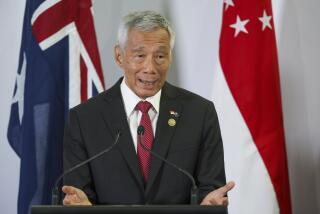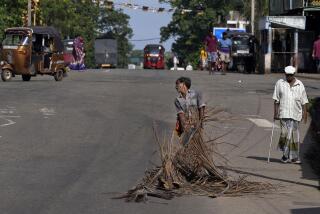Outlook Dim on Singapore Slump
SINGAPORE — As this island nation starts a new year that is likely to be as economically gloomy as 1985, the government has come under unusually candid attack from local businessmen who blame it for the economic reverses.
Investors in manufacturing and other sectors of business lost money because of frequent and sudden policy changes by the government of Prime Minister Lee Kuan Yew, according to a report to a committee trying to steer Singapore out of its slump.
“This attitude of the government creates resentment and uncertainty in the minds of most local investors in that they fear they will be discarded and left by the wayside,” the subcommittee on local businesses said.
If Lee’s government might challenge the accuracy of this diagnosis, it would not dispute the severity of the reverses suffered by a country that had been a model for the Asian economic miracle.
Preliminary figures show that gross domestic product (GDP) shrank by 2% last year, its worst performance in 20 years. Businessmen doubt if 1986 will be much better.
Lee himself has said: “It is difficult to see great improvement next year because even if there should be a pickup in the American economy, which may boost our manufacturing, our construction is slowing down.”
Speculation About Leader’s Son
There is speculation that the Cabinet might appoint the prime minister’s elder son, Lee Hsieng Long, to play a major role in achieving economic recovery. Trade and Industry Minister Tony Tan was quoted by local newspapers recently as saying that the younger Lee was the best person to plan Singapore’s economic course, as he is chairman of the Economic Committee. This is the government-appointed body whose subcommittee has just accused the government of shaking business confidence.
The fall in GDP after the 8.2% growth of 1984 mirrored a decline in nearly all sectors of the economy but especially in construction and manufacturing, which fell 16% and 10.1%, respectively, in the third quarter. Officials say construction accounts for 8% of GDP. But Lee said that, with some big projects nearing completion, construction activity will fall by 2% or 3% of GDP. “So any increase must first cover this construction deficit before we reach zero (GDP),” he said.
Lee said he thinks it will take about three years to break through the slump because some manufacturing industries will require more than two years to recover. Most industrialists surveyed by the government felt that business would remain static or worsen in the first quarter of 1986.
Upcoming Difficulties
The manufacturing subcommittee of the Economic Committee said that major industries will face difficulties for several years. It expected oil refinery output to drop by between 30% and 40%, to between 500,000 and 600,000 barrels per day, by the end of this year. With continued imports of Middle East products, the situation probably will deteriorate further until about 1987, it said. Nor is the outlook any better for the oil rig fabrication, oil service, shipbuilding and ship repair industries.
Manufacturing exports account for a fifth of GDP and this year’s poor demand from Singapore’s main trading partners--the United States, Malaysia and Indonesia--will not improve, businessmen said. Some expect more U.S. demand for electronic products, a major industry here, by the third quarter.
Total investment commitments, two-thirds from abroad, are expected to reach $470 million for 1985 against $850 million in 1984.
The Economic Committee expects new trends in world trade to make investment promotion more difficult. But businessmen blame high operating costs here for making Singapore less competitive than Hong Kong, South Korea and Taiwan.
The committee is due to recommend remedial action to the Cabinet early this year. Its subcommittee on local businesses has asked for a two- to three-year wage freeze, tax cuts, lower employer contributions to a compulsory pension savings fund and a halt to government encroachments on the private sector.
Finance Minister Richard Hu has already indicated that he wants to cut costs and raise productivity. He said that the government will push ahead plans to privatize but that it has not yet made up its mind on the 40% corporate tax.
More to Read
Inside the business of entertainment
The Wide Shot brings you news, analysis and insights on everything from streaming wars to production — and what it all means for the future.
You may occasionally receive promotional content from the Los Angeles Times.










